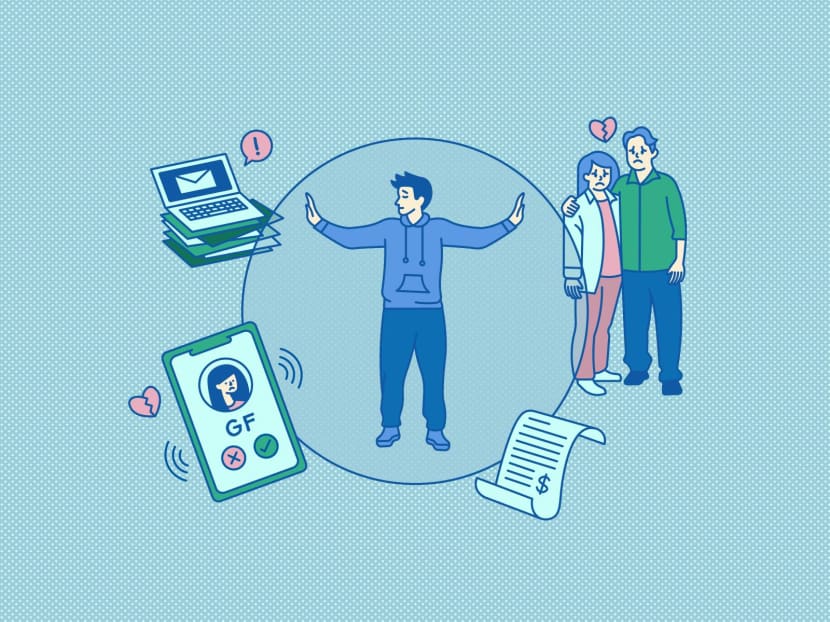Unread texts, unpaid bills: When does avoidant behaviour become an issue?
Mental health experts said that avoidance or inaction might be linked to a desire for perfection and doing things right. Other times, it is like a coping mechanism for someone to deal with discomfort.

In some instances, people avoid doing certain tasks because they do not feel confident to complete them proficiently. (Illustration: CNA/Nurjannah Suhaimi)

This audio is generated by an AI tool.
A friend of mine used to be very prompt when texting messages, with replies coming back to me as fast as my questions and my random musings even receiving an emoji reaction within split seconds.
Then, more recently, there was a significant lag in those replies, with my messages going unread for days, making me wonder if she was ghosting me.
Much to my relief, she told me later that it was nothing personal and that she has more than 300 unread texts across different messaging platforms.
There wasn't a particular incident that had set her life in disarray and caused this pile up of unread texts, it was "just life", she said.
She thought that avoiding looking at the messages and thinking of how to reply them would give her some breathing room, but as those unread texts piled up, she found herself feeling more stressed and this in turn made it even harder for her to tackle the backlog.
Another friend of mine delays paying his monthly credit card bills until the last moment, right before he is levied with a late charge.
He said that it was not a matter of an item on his to-do list slipping his mind or not having enough money to pay, but more that he would rather not face this unpleasant but necessary errand till the eleventh hour.
I, too, have my fair share of uncomfortable tasks and situations that I'd rather avoid.
In the context of work, for instance, I happily and quickly hop on a call with a transportation expert or housing analyst as soon as a story brief is handed to me.
But ask me to conduct street interviews with strangers or cold-call the family members of a deceased for an interview? You'll suddenly see me going through my notes and list of questions a couple of times more than usual, just so I can avoid the task by another minute or two.
Based on my encounters with friends and after reflecting on my own behaviour, avoidance seems quite a commonplace practice.
Should we cut ourselves some slack and not feel that we need to complete or respond to everything promptly or is this a sign of something more worrying?
LIMITED TANK TO DEAL WITH LIFE
Mental health experts said that most of the time, avoiding taking action in certain tasks is simply due to a lack of motivation or interest towards the task, like in the case of my friend with his credit card bill.
They added that dealing with issues no matter how big or small requires energy and takes on a certain mental load.
Ms Tiffany Ng, an associate counsellor from psychological consultancy firm Mind What Matters, said that everyone has a limited “tank” or capacity to deal with life’s situations and tasks at any given point of time.
“When it is low, the amount of effort required to complete certain tasks can feel more overwhelming than when we have a fuller tank. Avoiding would seem like an easier, less effortful option.”
In other instances, avoidance becomes like a coping mechanism for someone to deal with discomfort.
Dr Roy Chan, consultant clinical psychologist and founder of psychotherapy provider Cloaks and Mirror, said: "In your work example, it could signal an anxiety towards feeling that the person's work is not good enough, or that the work is only passable after lots of effort and rigorous preparation (such as extra reading) is done."
When it comes to more personal conversations, people also tend to avoid replying messages if it covers topics that might be triggering or uncomfortable to them.
For example, if a friend wants to discuss his recent break-up via text message, this might unearth some painful personal memories for the recipient of the message.
For some people, avoidance comes about when they feel that it is pointless to take action since the outcome is likely not to be one that they desire.
That being said, Ms Kok Yun Fern, clinical psychologist from therapy outfit Heartscape Psychology, cautioned that frequently delaying tasks or not completing them at all "can be even more costly" for the person.
For instance, one might put off replying a text from a friend who is seeking emotional support, with hopes of taking time to find the right words to reply them.
"(But) a delayed and untimely reply may undo the original intent to be fully present for the friend. This can cause further misunderstandings," she explained.
"Sometimes, the pursuit of perfection takes away the opportunity to learn and grow. The person who avoids tasks may view it as trying to ‘get things right’, but this can lead to a poorer ability to adapt, which can be unhealthy."
IS IT MORE THAN JUST "LEAVING IT TILL LATER"?
While we cannot be expected to take immediate action for every single scenario that we face, avoidance becomes a cause for concern if it happens too frequently or begins to affect our functioning, mental health experts said.
In our personal lives, tell-tale signs include withdrawing socially or neglecting people around us.
“It could look like falling behind at work or falling behind on deadlines, finding it hard to start or complete a task,” Dr Chan said.
Sometimes, avoidance can also manifest in the form of engaging in harmful distractions such as substance abuse, Ms Ng from Mind What Matters cautioned.
Dr Chan highlighted that even psychologists are always reminded to monitor their own levels of psychological self-care, because they would not be able to help others if they themselves are feeling overwhelmed.
“It is like in the safety briefing on the aircraft, where you help yourself with your mask before helping others, since you cannot help others if you are gasping for air,” he said.
How then should individuals address their avoidance issues if they find it reaching worrying levels?
One practical way to address such behaviour is to break down seemingly overwhelming tasks into “more digestible” parts where possible and then start by tackling the easiest portion first, Ms Ng advised.
Ms Kok said that after taking action and reviewing the outcome, we may want to reward ourselves for attempting the task.
Where the avoidance or inaction might be linked to a desire for doing things right, Ms Kok has this advice to add.
“Be open and mentally ready for errors and shortcomings – that’s where growth begins. Be mindful and accept that failures and errors are bound to happen in the process of learning.”
To help ourselves in the long term, the mental health experts emphasised that it is crucial to take a step back and ask ourselves questions about why we are avoiding the tasks in the first place.
“Equally important is a counter balance to the discomfort, by recalling the efforts that we have already taken to engage with the person or task, and the limits of what we are willing to do,” Dr Chan said.
“Thinking about these would help take care of ourselves and alleviate some of the discomfort we feel.
"If we feel safe enough, we may even take it to the person we are avoiding to share our thoughts, so as to reduce the pressure that is placed on us.”
What if we are the one encountering someone displaying an avoidant behaviour instead?
In a work setting where a colleague's avoidance might affect your work, Ms Kok from Heartscape Psychology stressed the importance of being "respectful and professional when the nudging is necessary" and to stay away from making personal or accusatory comments.
It would also be helpful to lay out realistic and specific deadlines from the get-go for that person to work towards them, instead of leaving it to him or her to decide on the schedule.
More generally, instead of pressuring a response from avoidant persons, Dr Chan said that it would be helpful to let them know that we are trying to engage them because we value what they have to say.
"This would make them feel valued. It can help take away some of their resistance, especially if they might be feeling forced," he added.















